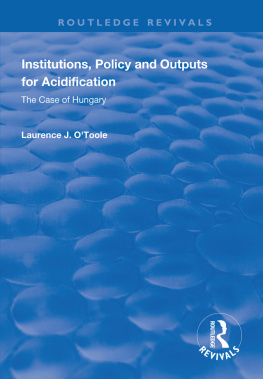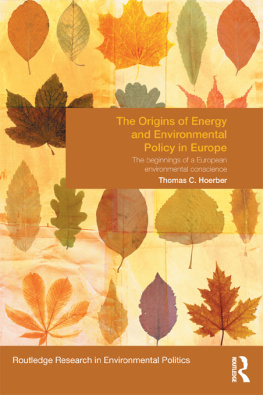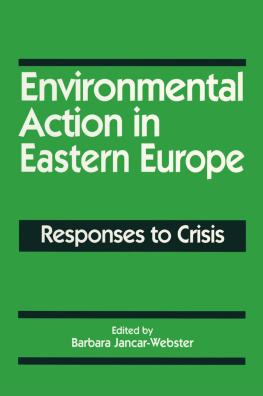First published 1998 by Ashgate Publishing
Reissued 2018 by Routledge
2 Park Square, Milton Park, Abingdon, Oxon, OX14 4RN
711 Third Avenue, New York, NY 10017, USA
Routledge is an imprint of the Taylor & Francis Group, an informa business
Copyright Laurence J. OToole, Jr 1998
All rights reserved. No part of this book may be reprinted or reproduced or utilised in any form or by any electronic, mechanical, or other means, now known or hereafter invented, including photocopying and recording, or in any information storage or retrieval system, without permission in writing from the publishers.
Notice:
Product or corporate names may be trademarks or registered trademarks, and are used only for identification and explanation without intent to infringe.
Publishers Note
The publisher has gone to great lengths to ensure the quality of this reprint but points out that some imperfections in the original copies may be apparent.
Disclaimer
The publisher has made every effort to trace copyright holders and welcomes correspondence from those they have been unable to contact.
A Library of Congress record exists under LC control number: 97076939
ISBN 13: 978-1-138-32212-7 (hbk)
ISBN 13: 978-0-429-45225-3 (ebk)
This volume reports the results of a study of the implementation of one set of international environmental agreements in one nation over a period of approximately ten years. The agreements are those stemming from the Convention on Long Range Trans-boundary Air Pollution (CLRTAP) of the Economic Commission of Europe and encompass a set of protocols adopted by many countries. The emphasis on implementa-tion, as opposed to a concentration on adoption, reflects the choice to focus on the following research question: do such agreements make a demonstrable impact 'on the ground'-or in this case, in the air? The nation receiving attention here is Hungary, both before and during the political and economic transformations that have been so consequential in recent years.
This subject is best approached by building upon and integrating multiple perspectives. The analysis in this book draws from the ideas and insights of three streams of scholarship: the systematic study of policy implementation; the emphasis in international relations on understanding the role and significance of international regimes like those addressing environmental issues; and the analysis of the so-called 'countries in transition', the nations undergoing shifts from state-socialist systems to democratic and market-based arrangements in Central and Eastern Europe. Each of these subjects is a specialty on its own, and each has developed largely in isolation from the others. Combining them, nonetheless, seems an appropriate strategy for understanding the impact of CLRTAP in Hungary and, in complementary fashion, enhancing theory building in these fields.
A good deal of my recent research has been devoted to the analysis of programs aimed at protecting and improving the environment, a subject of intense and growing concern in many countries. As a long-time student of policy implementation, as well, I have come to be aware of the strengths and also the limitations of some conventional frameworks and theories of that specialty. I have become convinced that, particularly for policy problems like those crossing governments' jurisdictional lines, so-called 'top-down' perspectives offer at most highly incomplete analytical approaches. Indeed, these formulations can be positively misleading; they suggest that the solution to policy challenges can be found in strong authority, tight control, close monitoring, and substantial sanctions. And yet-other objections aside-for international environmental policy issues there is no strong common authority across the relevant parties, tight control is likely to be a mirage, close monitoring is no mean feat, and the application of serious sanctions is often infeasible. Top-down perspectives, in short, provide little guidance either in explaining the range of variation across extant cases or in assisting actors in the world of practice in improving the utility, implementability, and effectiveness of international agreements. The implementation of international environmental agreements is thus attractive as a subject through which ideas about implementation beyond hierarchy can be developed and refined.
An additional concern with the limitations of recent theoretical ideas about policy implementation stimulated my interest in pursuing this kind of investigation in Central and Eastern Europe in particular. A few years ago, I explored issues of implementation in another substantive area, privatization policy, in the early years of Hungary's post-socialist transition. (As it turns out, the privatization effort is connected to parts of the implementation experience for air quality-as the present book makes clear.) That work convinced me that frameworks and theories of policy implementation, as developed in Western Europe and the United States, carry implicit premises-regarding regime stability and wide-spread commitment to the principles undergirding liberal systems-that do not necessarily hold elsewhere. In particular, I found that standard perspectives on processes of implementation do not explain much that is of interest in transitional settings like that in Hungary, and it can be important to think afresh about processes of coordinating and concerting action. Here, after all, public programs are adopted by and through national regimes that are in substantial flux.
This finding, nevertheless, suggests some cautionary points worth emphasizing at the outset. This volume consists of the study of a case or, for comparisons across protocols developed under CLRTAP, a set of closely related cases. The detailed examination over a period of years clearly offers advantages. But generalizing from this experience to the universe of international environmental agreements is hazardous. Furthermore, Hungary is one nation, and hardly a typical one at that. While a study of the Hungarian experience can be highly revealing about both the limitations of conventional perspectives and also the subject of implementation under transitional conditions, the results of this research must be treated with circumspection by those interested in other countries and other conditions. Indeed, as explained more carefully in the body of this volume, the unusual nature of recent Hungarian experience-with many change processes developing simultaneously-creates difficulties in determining which elements of the international agreement and regime, or even which domestic influences, may be responsible for any observable results-in terms of air quality or compliance with international commitments, for example. Still, most scholarship on the role of such agreements has concentrated on Western nations and the development of national commitments-as opposed to the impacts of formal agreements on patterns and practices within participating nations. This book extends this line of research to the important Central and Eastern European region and into the crucial 'details' of implementation. It may be of interest to specialists on several topics, including environmental policy and politics, the politics and economics of the Central and Eastern Europe, international organizations and international environmental agreements, policy implementation, and air quality and acidification.







